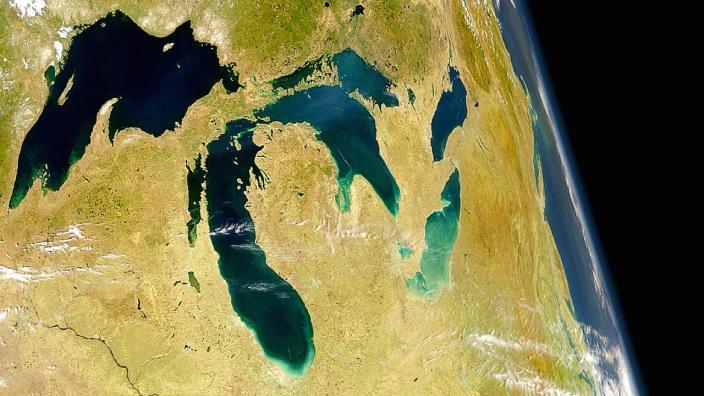A team of prominent water resource scientists, including Robert W. Sterner, UMD professor and director of the Large Lakes Observatory, are announcing "Grand Challenges for Research in the Laurentian Great Lakes" in their paper, published in the journal Limnology and Oceanography on June 15, 2017.
The team points out the wide scientific gaps concerning how the lakes function and how they are changing. Their hope in articulating the grand challenges, says Sterner, is that citizens and decision-makers will embrace the need to strengthen scientific efforts to understand the Great Lakes. “Policy makers need help from the scientific community in order to make good decisions that will slow the current global freshwater crisis."All of the authors ultimately seek an integrated understanding of the Great Lakes ecosystem.
They detail the urgency of the five grand challenges that will help address these gaps:
(1) How has this vast inland freshwater system responded to shifting climate in the past, and how will it respond in the future?
(2) What is the current status of the most important ecosystem processes, including their variability in space and time?
(3) What processes are characteristic only of large lakes, and how do the distinct habitats integrate into a whole?
(4) What are the ecosystem responses to major anthropogenic forces such as nutrients and invasive species, and are these reversible? and
(5) What are the small to large-scale linkages and feedbacks among societal decisions, biological systems, and physicochemical dynamics?
URGENCY
Sterner says the catalyst for the paper was a critical need for a unified scientific voice. “We had to articulate the Grand Challenges for research in the Laurentian Great Lakes (LGL) and the need for associated funding.”
The team’s goals coincide with other initiatives to support data gathering and increased attention on the LGL and the Earth's freshwaters in general, as well as a national and global water crisis.
“Climate and environmental pollution change, coupled with increasing demands for water for drinking, industry, transportation, aqua- and agriculture, extraction of fossil fuels and recreation, have created an unprecedented need for clean freshwater,” says Sterner.
The eight authors of the article urge citizens, researchers, and leaders to support greater scientific attention and increased binational research funding to improve the collective ability to wisely manage the LGL.
"These five lakes define the entire region, but when we examine the state of knowledge about how these lakes work, we find more questions than answers," Sterner says.
The article cites an example from the summer of 2014, when 450,000 residents of Toledo, Ohio, U.S.A. lacked drinking water for two days due to an outbreak of toxic cyanobacteria in Lake Erie. Though there is an understanding that too much nutrients cause these algal blooms, the specifics needed to manage future problems are still missing.
AUTHORS
The work was authored by an international team that has had extensive experience in the Great Lakes:
* Robert W. Sterner, professor and director of the Large Lakes Observatory, University of Minnesota Duluth.
*Peggy Ostrom, professor of integrative biology, Michigan State University;
*Nathaniel E. Ostrom, professor, Department of Zoology, Michigan State University;
*J. Val Klump. professor and associate dean of research, and senior director of the School of Freshwater Sciences, UW-Milwaukee;
*Alan D. Steinman, professor of water resources, Grand Valley State University;
*Erin A. Dreelin, assistant professor; associate director of the Center for Water Sciences, Michigan State University;
*M. Jake Vander Zanden, professor, Center for Limnology and Department of Zoology, University of Wisconsin; and
*Aaron T. Fisk, professor, Canada Research Chair, University of Windsor.
BACKGROUND
The work arose from an unprecedented 2014 workshop organized by and supported by Michigan State University. There, 58 water resources researchers gathered to synthesize issues and action steps necessary for improvement of the health of the Great Lakes. Following that event, the eight coauthors further developed and refined a list of the most pressing scientific issues facing the Laurentian Great Lakes (LGL).
The LGL constitute one of the largest freshwater systems in the world. They have an impact on the communities and economy of two powerful nations. "In spite of their social importance, scientific research has not kept pace with these growing needs," says Sterner. "Basic information is needed to forecast change, mitigate impacts, and restore and preserve the Great Lakes."
-----------

